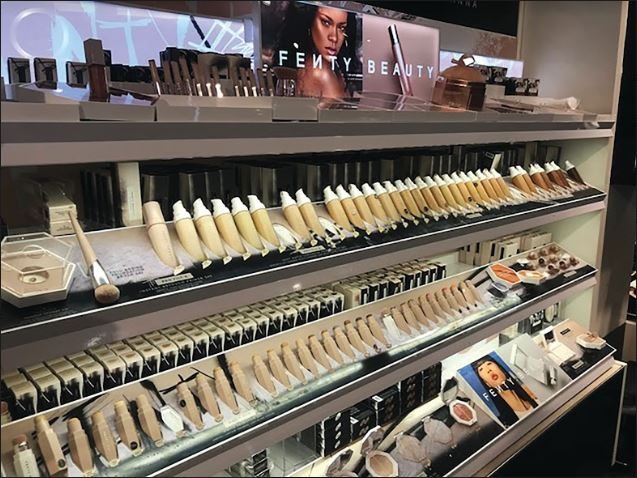Veshani Sewlall | Contributor
Featured Image: Rihanna’s Fenty Beauty Campaign stands up for beauty for all. | Golnaz Taherian
If you’ve ever stepped into a makeup store and struggled to find products that matched your skin tone, you’re not alone. It’s not a secret that women of colour face more difficulties finding makeup brands that suit their needs and increase their confidence. Frustrated by the matter, Hollywood singer Rihanna took matters into her own hands.
Rihanna’s Fenty Beauty makeup line, which launched in September 2017, is taking the beauty industry by storm. With an impressive foundation line that features 40 different shades, Fenty Beauty is a game changer for inclusive makeup suitable for all skin types and tones.
“I think she thoroughly understands her impact in the pop culture landscape,” says Judy Szczytynksi, a fourth-year communications student. She adds: “When coming out with her Fenty Beauty makeup line, she made sure to be representative of all skin types.”
From consumers to industry professionals alike, Rihanna is receiving appraisal reviews about offering shades for just about everyone. Winnie Offei, a second-year health student, says, “As a black woman, it’s nice to finally be able to find a shade that suits my skin tone without being too light or ashy.”
As ‘Allure’ points out, there’s no surprise that Eurocentric beauty standards dominate the beauty industry. This social beauty norm has spread all over the world through mainstream media. These ideals fail to acknowledge and represent real diversity in women, from skin tone to race.
For many women, makeup serves as a form of self-expression and is closely linked to their identity. Eurocentric beauty values can marginalize women of colour. This is very damaging towards these women as it creates unrealistic beliefs that there’s only a single definition of beauty.
Rihanna’s line challenges the status quo in the beauty industry and changes what it means to be beautiful. Her makeup line celebrates feminine diversity and empowers women to stay true to themselves. In this way, Rihanna tackles an industry-wide problem and proves that colour sells.
According to Allure, Fenty Beauty’s advertising campaign is inclusive, as it features models of colour, including Leomie Anderson, Duckie Thot, and Halima Aden. Rihanna’s line reminds us that more beauty brands need to represent women of colour and feature complex options for them as well.
Fenty Beauty user, Alexsis Theodore, a third year English major, says that, “Rihanna and Fenty Beauty have set a standard and inspired others in the beauty industry to be more inclusive with complexion tones but also with body types, as seen in the brand’s ad campaigns.”
The makeup line connects women of colour at a personal level and, quite literally, skin level. Rihanna has showed that representation in makeup culture comes a long way in showing and changing beauty standards. This is just the start of inclusivity within the industry; there is much work yet to be done.


